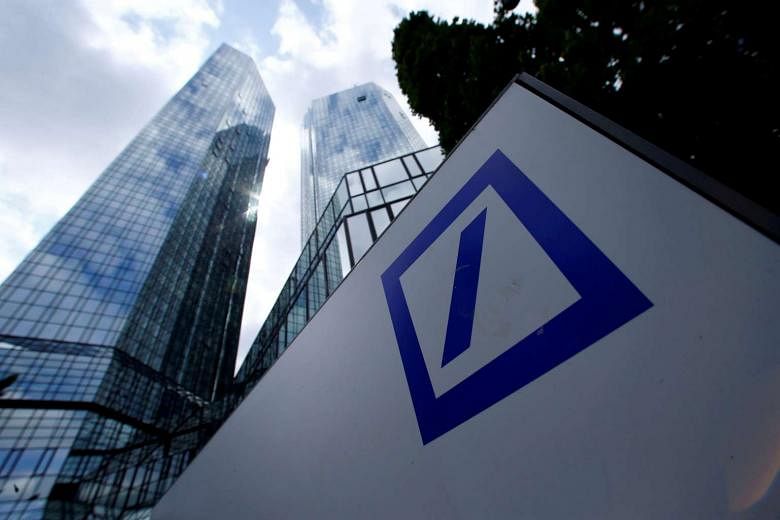LONDON (BLOOMBERG) - Amid mounting concern about Deutsche Bank's ability to withstand pending legal penalties, about 10 hedge funds that do business with the German lender have moved to reduce their financial exposure.
The funds, a small subset of the more than 800 clients in the bank's hedge fund business, have moved part of their listed derivatives holdings to other firms this week, according to an internal bank document seen by Bloomberg News.
Among them are Izzy Englander's US$34 billion Millennium Partners, Chris Rokos's US$4 billion Rokos Capital Management, and the US$14 billion Capula Investment Management. The hedge funds use Deutsche Bank to clear their listed derivatives transactions because they are not members of clearinghouses.
Deutsche Bank's New York-listed shares fell 6.7 per cent to a record low of US$11.48 on Thursday.
"In any given week, we experience ebbs and inflows," said Barry Bausano, the bank's chairman of hedge funds. "And this week is no different; it goes on all the time." He declined to comment on net flows.
While the vast majority of Deutsche Bank's more than 200 derivatives-clearing clients have made no changes, the hedge funds' move highlights concern among some counterparties about doing business with Europe's largest investment bank.
Deutsche Bank's stock and debt have been under pressure after the US Justice Department this month requested US$14 billion to settle an investigation into the mis-selling of residential mortgage-backed securities. The bank has said it expects to negotiate that lower, as other Wall Street banks have.
The amount sought by the US is not far from the Deutsche Bank's current market value of 15 billion euros (US$16.8 billion).
Credit-default swaps protecting Deutsche Bank bonds surged to a six-month high earlier this week, according to data compiled by CMA, while the stock hit a record intraday low of 10.18 euros.
The financial pressure on the lender is spilling over into German politics, stirring speculation Chancellor Angela Merkel's government might be forced to offer support. Chief Executive Officer John Cryan told Bild newspaper this week that government aid was "out of the question." Any taxpayer-funded solution for the bank's troubles would be Merkel's downfall, according to the leader of Germany's biggest opposition party.
The International Monetary Fund in June said Deutsche Bank may be the biggest contributor to risk among so-called global systemically important banks. The bank has gross notional derivatives exposure of 46 trillion euros, according to an Investor Relations presentation published this month. After netting and collateral, reported derivative trading assets fall to 41 billion euros, the bank said.
"The issue here is now one of confidence," said Chris Wheeler, a financial analyst with Atlantic Equities in London. "That's what's going on here. The thinking is 'Deutsche Bank is fine, but there's a slim chance it might not be, so why leave my money in there?'"
Clients review their exposure to counterparties to avoid situations like the 2008 collapse of Lehman Brothers Holdings and MF Global's 2011 bankruptcy when hedge funds had billions of dollars of assets frozen until the resolution of lengthy legal proceedings.
In a memo to staff outlining how to deal with client inquiries, dated Sept 27, the bank said that customers broadly understand that "CDS are no longer a necessarily accurate reflection of counterparty risk," according to a copy seen by Bloomberg. The bank's funding costs have remained lower than CDS spreads indicate this year, according to the note, and liquidity reserves are more than three times higher than in 2007.
"Deutsche has many problems, but liquidity is not one of them," Stuart Graham, founder of Autonomous Research, said in a note, adding the bank had a liquidity reserve of 223 billion euros as of the second quarter.
"There can be no doubt that Deutsche could access significant additional liquidity from the ECB, should it ever need it."
Investor concerns had eased on Wednesday after Deutsche Bank agreed to sell its Abbey Life insurance operations for £935 million and CEO Cryan ruled out a capital increase. The shares rose 2 per cent that day and gained another 1 per cent in Frankfurt on Thursday, before news of the hedge funds' moves broke.
Deutsche Bank has long struggled to adapt to an era of tougher capital requirements and diminished trading revenue. The pressure has intensified since mid-September, when the US Justice Department's US$14 billion demand was revealed.
Deutsche Bank's stock has a price-to-book ratio of 0.233, the third-lowest among euro zone lenders listed on the 26-member Euro Stoxx Bank Index, according to Simon Ballard, a credit strategist who writes for Bloomberg.

